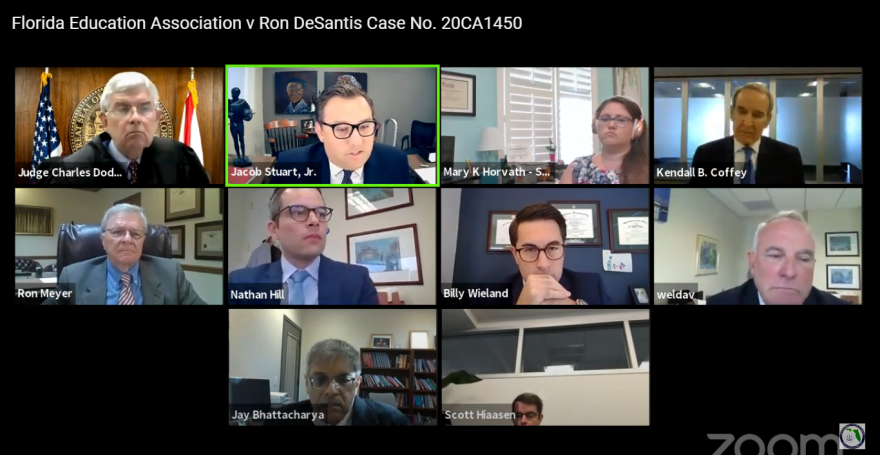Both sides have rested their cases and closing arguments have been heard in the legal challenge to education commissioner Richard Corcoran’s order requiring brick-and-mortar schools to operate in the fall. Here’s what’s played out in the virtual courtroom over the past three days:
The high-profile lawsuit was brought by statewide teachers union, the Florida Education Association. It alleges state education commissioner Richard Corcoran’s order calling for brick-and-mortar campuses to operate in the fall violates the state constitution, which requires public schools be “safe.”
At noon Friday, both sides presented their closing arguments.
Billy Weiland, an attorney for the teachers union, centered his remarks to the judge on educators being “forced” to return to campus, claiming the state’s order leave them no choice.
“All teachers should have a choice on whether or not they should return to schools. If they don’t feel safe? They shouldn’t have to return to schools. Your honor, as I said before it’s one thing to say something, and another thing to do something,” Weiland argued. “In reality, they haven’t been given a choice.”
David Wells, representing the state, says the union’s lawsuit is actually going against local decisions, of districts that have submitted reopening plans.
“These plaintiffs, these teacher unions, aren’t in the position to come in and say that the policy makers in these 66 different districts have done something wrong, and therefore, your honor, should go ahead and rewrite this order and throw it out, because they think it could be a problem. It isn’t and they have not proven that,” Wells said.
The FEA argues the state is holding hostage funding, which would be withheld if schools don’t offer in-person services starting at the end of the month.
The two full-day hearings Wednesday and Thursday, centered largely on the teachers union and the state calling witnesses to strengthen their arguments:
The FEA called teachers who expressed fear in the risk of the virus, with little faith in preventative measures in pace. The teachers union also called on doctors who say return to classes will vastly increase community spread.
The state in turn questioned its own doctors, who say child-to-adult transmission isn’t a significant risk; and parents who say keeping their child home is a detriment to their development.
James Lis, a teacher who is one of the plaintiffs in the suit, was called by FEA lawyers to testify. He and his wife live in the same home with Lis’ elderly mother-in-law, something that gives him anxiety about returning to work.
FEA Attorney: “Does your mother-in-law, does she have any medical conditions that would make her susceptible to COVID-19?”
Lis: “Well, as I look at the CDC guidelines, just her age alone – the fact that she’s 81 puts her in the high-risk category.”
Lis teaches biology at an Orlando high school. The 21-year veteran of the classroom teaches in a portable – unavoidable close quarters with students. Lis worries for his health, and the health of his wife as well.
“We’re both over 50, and so, from everything I’ve seen, there are definite risk factors,” he said. “I have high blood sugar – not quite diabetes yet, but that’s a concern to me.”
In an emotional moment during questioning by FEA lawyers, Lis said he’d choose protecting the health of his family over returning to teach his students in-person.
“I mean, I’ve chosen my kids, my students, over so many difficult things., But, I can’t put my family at risk,” Lis said, fighting back tears.
The teachers union’s lawyers also called a medical professional to testify. Doctor Annette Nielsen serves on an advisory board for Orange County Schools.
“Numbers are going to increase. You’re going to have kids get sick, you’re going to have teachers become sick. You’re going to have – everyone in the school will have a close contact who becomes sick,” Neilsen said. “So not only will you have illness, but then in response to that, you’ll also have complications. Whether that’s heart issues, dialysis issues – a multitude of issues that you can have.”
On Thursday, the state had doctors of their own ready to rebut points made by those called by the FEA.
One of them is Stanford professor and researcher Dr. Jay Bhattacharya. Using his testimony, the state tried poking holes in the theory that child-to-adult COVID-19 transmission is a risk
“The main finding from that literature is that kids do not pass the disease on to adults at any appreciable rate,” Bhattacharya said. “The risk that kids pose to adults is very, very small, even if they’re positive.”
There, Dr. Bhattacharya cited a study done in Iceland, published in the New England Journal of Medicine. Jacob Stuart, an attorney representing the teachers union, called into question Bhattacharya’s credibility.
Stuart: “After medical school, did you ever complete an internship or residency?”
Bhattacharya: “No, I do research full-time.”
Stuart: “So, it’s fair to say then, part of your research, you’ve never treated any patient formally, your entire career. Is that right?”
Bhattacharya: “In medical school I did, but no – I do research full time.”
Stuart: “Have you ever treated anyone with COVID-19?”
Bhattacharya: “I don’t treat patients; I do research full-time.”
The state’s attorney’s also questioned Jennifer Tribble, a parent of two Florida students.
“Do you think that remote learning can ever work for your children,” Wells asked.
“Maybe when they’re older,” Tribble said. “Maybe when there’s some discipline. But, a second and third grader, which is what they were last year, and now a third and fourth grader – they don’t have that attention span. And they need … I just think they need interaction.”
Leon County Judge Charles Dodson is expected to make a ruling in the case early next week.


